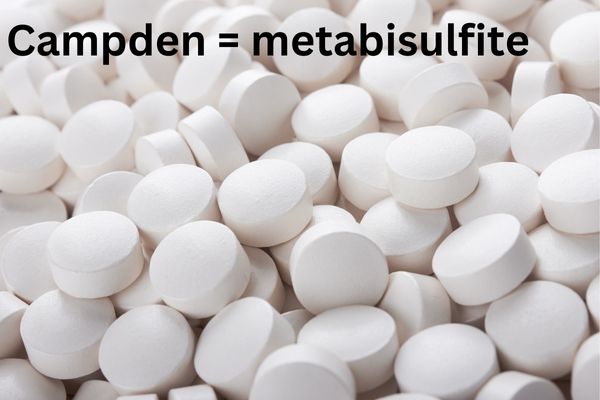Sulfites in beer? You might be surprised to learn that they exist. Sulfites are commonly associated with wines, but they can also be found in certain beers. Let’s dive into the world of sulfites in beer and explore their purpose and importance.
Overview of sulfites in beer
Sulfites, including sulfur dioxide, are compounds that are naturally produced during the fermentation process.
While sulfites occur naturally, some breweries also add sulfites to their beers as an additional preservative.
In beer production, sulfites are used as preservatives to prevent oxidation and spoilage, but usually the naturally formed sulfites are the predominant ones found in beer.
They help maintain the quality and freshness of the beer by inhibiting the growth of unwanted bacteria and yeasts.
This is particularly common in beers with a longer shelf life or those that are exported over long distances. However, it’s important to note that the use of sulfites in beer is strictly regulated in many countries to ensure consumer safety and avoid allergic reactions.
Sulfite Content in Different Beer Types
The sulfite content in beer can vary based on several factors, including the beer type, the brewing process, and whether or not additional sulfites were added during brewing. Here’s a guide to understanding the typical sulfite content found in various beer styles:
| Beer Type | Typical Sulfite Content (ppm) | Notes |
|---|---|---|
| Lager | 10-20 ppm | Lagers, especially mass-produced ones, might have slightly higher sulfite content due to the preservation needs of longer shelf lives. |
| Ale | 5-15 ppm | Ales, particularly those from craft breweries, might have lower sulfite levels. They’re also brewed at warmer temperatures which can influence sulfite production. |
| Stout | 5-10 ppm | Darker beers like stouts generally have fewer sulfites, especially if they rely more on roasted malts for preservation. |
| Wheat Beer | 10-20 ppm | The cloudy nature and freshness of wheat beers might sometimes warrant slightly higher sulfite levels. |
| IPA (India Pale Ale) | 10-25 ppm | Historically, IPAs had higher hop content for preservation during long sea voyages. Modern IPAs, especially if dry-hopped, may have varied sulfite content based on brewing practices. |
| Sour Beers | 5-10 ppm | Due to the presence of lactic acid bacteria and wild yeasts, sour beers may naturally have lower sulfite levels. |
| Barleywine | 15-25 ppm | Being a stronger and sometimes sweeter beer, barleywines might have higher sulfites for preservation. |
| Cider | 20-150 ppm | While not a beer, it’s worth noting that ciders can have higher sulfite levels, especially if no preservatives other than sulfites are used. |
As beer production methods and consumer demands evolve, brewers continue to adapt their techniques. This might lead to shifts in typical sulfite contents in the future. Always ensure you’re up-to-date with the latest brewing trends and information if sulfites are a concern for you.
Where Do Sulfites Come From?
Contrary to common misconception, sulfites are a natural product of yeast fermentation. So, if you’re sipping on any fermented beverage, chances are, you’re consuming a degree of sulfites. Sulfites also have other utilities in beer production.

They’re used in preventing oxidation, inhibiting microbial growth, and even sanitizing brewing equipment. They can be found in powdered form as sodium metabisulfite and potassium metabisulfite, each having their specific characteristics.
It’s essential to differentiate between sulfites and the off-flavors often associated with them. Sulfites are NOT responsible for the sulfurous/rotten egg aroma — hydrogen sulfide and ethyl mercaptan are the real culprits.
Natural Sulfite Production
Natural sulfite is an antioxidant produced by yeast during fermentation. The amount present at the end of fermentation varies, with most strains producing less than 30ppm. Factors like must/wort clarity and low aeration can promote this production. Thus, the fermentation conditions you opt for can significantly influence the sulfite levels in your beer.
The Importance of Fermentation Conditions and Yeasts
Beer’s flavor stability is profoundly affected by the sulfite levels, which are determined by wort fermentation conditions. Parameters like wort aeration, pitching rate, temperature, and pressure play critical roles in sulfur dioxide formation during brewing.
For instance, the findings of Kaneda et al. suggest that wort fermentation conditions impact both the sulfite level and beer’s flavor stability. The research emphasizes that the right sulfite concentration in packaged beer enhances the beer’s flavor stability.
Additionally, the type of yeast used is crucial. Ale yeasts and lager yeasts differ in their sulfite production capabilities, which can lead to varying sulfite concentrations in the final beer. Yeasts produce sulfites by reducing sulfate, and certain yeast strains can generate significantly different amounts of sulfite.
How to Avoid Excessive Sulfites when brewing
- Low Oxygen Brewing: One way to combat excessive sulfites is to adopt low oxygen brewing. In this method, sulfite is added just before dough-in to stave off oxidation. This is crucial as sulfites play an essential role in preventing oxidation.
- Monitor Fermentation Conditions: As emphasized earlier, the conditions under which fermentation occurs have a direct impact on the sulfite levels. Brewers should pay attention to factors like wort aeration, pitching rate, temperature, and pressure.
- Choice of Metabisulfite: While both sodium and potassium metabisulfite serve the purpose, the latter is generally preferred in winemaking due to its flavor neutrality. In beer brewing, one should be cautious as high potassium levels can inhibit enzymes during the mash.
Importance of sulfites in beer preservation
The preservation of beer is crucial for maintaining its taste, aroma, and overall quality. Sulfites play a vital role in this preservation process.
By inhibiting the growth of microorganisms and preventing oxidation, sulfites help extend the shelf life of the beer. This is especially important for breweries that distribute their products nationwide or globally.

Additionally, sulfites contribute to the stability of beer by preventing unwanted changes in color, flavor, and aroma. They help maintain the desired characteristics of the beer, ensuring that consumers can enjoy a consistent and enjoyable drinking experience.
It’s worth mentioning that sulfites in beer are generally safe for most individuals. However, if you have a sulfite allergy or sensitivity, it’s essential to check the label or consult with the brewery to determine if the beer contains sulfites.
In conclusion, sulfites in beer serve as preservatives and contribute to the overall quality and stability of the product. They play a vital role in ensuring that beer remains fresh, flavorful, and enjoyable for consumers around the world.
Regulation and Analysis of Sulfites in Beer
Laws and regulations on sulfite declaration in alcoholic beverages
When it comes to regulating the use of sulfites in beer, there are specific laws and regulations in place. Sulfites are commonly used in the beer-making process as preservatives and antioxidants. However, some people may have sensitivities to sulfites, which is why it is important for breweries to declare the presence of sulfites on their beer labels.

In the United States, the Alcohol and Tobacco Tax and Trade Bureau (TTB) requires that any beverage containing more than 10 parts per million (ppm) of sulfites must declare the presence of sulfites on the label. This regulation helps consumers make informed choices about the products they consume.
It’s worth noting that sulfite sensitivities are relatively rare, affecting about 1% of the general population. However, for those individuals who do have sensitivities, the declaration of sulfites on beer labels is crucial in protecting their health.
Analytical techniques for measuring sulfite levels in beer
Breweries and regulatory bodies use various analytical techniques to measure sulfite levels in beer. One commonly employed method is the Monier-Williams method, which involves the reaction of sulfites with iodine in an acidic medium.
Other techniques include the Ripper method and the Azo-Dye method. These methods utilize chemical reactions to estimate the sulfite content in beer.
Analyzing sulfite levels in beer is essential not only to comply with regulations but also to ensure product quality and safety. By accurately measuring sulfite levels, breweries can maintain consistency in their products and offer consumers a reliable experience.
In conclusion, the regulation and analysis of sulfites in beer are crucial aspects of the brewing industry. Not only do these measures help protect consumers with sulfite sensitivities, but they also ensure beer quality and compliance with regulatory standards.
Role of Sulfites in Beer Quality
Sulfites play a crucial role in maintaining the quality and stability of beer. Although sulfites are commonly associated with wine, they are also used in beer production for various reasons.
Protection against beer staling
One of the main functions of sulfites in beer is to protect it from staling. Staling is the process of beer becoming stale or off-flavored over time. Sulfites act as antioxidants, preventing the oxidation of the beer’s components and preserving its freshness. By inhibiting the oxidation reactions, sulfites help extend the shelf life of beer and maintain its desired taste.
Inhibition of carbonyl compounds and flavor stability
Sulfites also play a role in inhibiting the formation of carbonyl compounds in beer. Carbonyl compounds can contribute to off-flavors and spoil the taste of beer. Sulfites react with these compounds, preventing their formation and maintaining the flavor stability of the beer.
It is important to note that sulfites are generally safe for consumption, but some individuals may be sensitive or allergic to them. In some countries, there are regulations regarding the use of sulfites in beer production, ensuring that they are used within safe and acceptable limits.
In conclusion, sulfites are essential in preserving the quality and stability of beer. They protect against staling and inhibit the formation of off-flavors, ensuring that the beer maintains its desired taste over time.
By understanding the role of sulfites in beer production, brewers can create a product that meets consumers’ expectations for freshness and flavor.
Contribution to Beer Quality and Shelf Life
The use of sulfites in beer production plays a crucial role in maintaining its quality and extending its shelf life.
Sulfites, also known as sulfur dioxide (SO2), are naturally occurring compounds that have been used for centuries in food preservation. In the case of beer, sulfites act as a preservative by preventing the growth of microorganisms and inhibiting enzymatic reactions that can lead to off-flavors and spoilage.

One of the key benefits of sulfites in beer is their ability to inhibit the growth of bacteria and wild yeasts. These microorganisms can produce off-flavors and cause turbidity, leading to an undesirable taste and appearance. By effectively controlling their growth, sulfites help to ensure the beer maintains its intended flavor profile and clarity.
Sulfites also play a role in protecting beer from oxidation. Oxidation occurs when beer comes into contact with oxygen, leading to the development of off-flavors and a decrease in overall quality. Sulfites can scavenge oxygen molecules, reducing the risk of oxidation and helping to preserve the beer’s freshness.
However, it is worth noting that excessive use of sulfites in beer production can have negative effects on flavor and aroma, resulting in a “sulfur-like” smell or taste. Brewers must strike a delicate balance between the benefits of sulfites and the potential drawbacks.
In conclusion, sulfites contribute significantly to the quality and shelf life of beer by preventing the growth of microorganisms, inhibiting enzymatic reactions, and protecting against oxidation. When used appropriately, sulfites help to maintain the beer’s intended flavor, clarity, and freshness, ensuring a positive drinking experience for consumers.
Sulfite Content in Beers
Most people are familiar with sulfites in wine, but did you know that sulfites are also present in many beers? Sulfites, which are compounds of sulfur, are commonly used as preservatives to prevent oxidation and extend the shelf life of beverages. While sulfites are generally safe for consumption, some individuals may have sensitivities or allergies to them. Here are a few key points about sulfite content in beers.
Acceptable levels of sulfite in beers
The acceptable levels of sulfites in beers vary depending on the country and the specific beer. In general, the levels of sulfites found in beers are relatively low compared to other alcoholic beverages, such as wines.
The US Food and Drug Administration (FDA) has set a limit of 10 parts per million (ppm) for sulfite residues in beers. This limit ensures that the sulfite content is within safe and acceptable levels for most individuals.
Labeling requirements for sulfite declaration in the USA and EU
In the United States, if the sulfite content in a beer exceeds 10 ppm, it is required by law to be labeled with a statement that says “Contains Sulfites.” This allows consumers with sulfite allergies or sensitivities to make informed decisions about the products they consume.
Similar labeling requirements exist in the European Union (EU) as well, where beers containing more than 10 ppm of sulfites must be labeled with the phrase “Contains Sulfites.”
Overall, while sulfites are commonly found in beers, the levels are generally low and within acceptable limits set by regulatory authorities. However, individuals with sulfite allergies or sensitivities should always check the labels and consult with healthcare professionals if they have any concerns.
Sulfites and Beer Stability
When it comes to beer production and preservation, sulfites play a vital role. These naturally occurring compounds are commonly used as additives in the brewing process to maintain beer stability and freshness.
Radical scavenging activity and prevention of free radical chain reactions
Sulfites, such as sulfur dioxide (SO2), exhibit excellent radical scavenging activity. This means that they can effectively neutralize harmful free radicals in beer. Free radicals are highly reactive molecules that can cause oxidative damage, leading to off-flavors, color changes, and overall beer deterioration. By preventing free radical chain reactions, sulfites help maintain the integrity and quality of the beer.
Masking of stale flavors through reaction with carbonyl staling compounds
Another important function of sulfites in beer is their ability to react with carbonyl staling compounds. These compounds are responsible for the development of stale flavors in beer over time. Sulfites can form stable complexes with these unwanted compounds, effectively masking their flavor impact and extending the beer’s shelf life.

It is worth noting that sulfites are generally safe to consume in moderate amounts. While some individuals may have sulfite sensitivity, the levels of sulfites typically found in beer are unlikely to cause adverse effects for the majority of people.
In conclusion, sulfites play a crucial role in maintaining the stability and freshness of beer. Their radical scavenging activity and ability to mask stale flavors contribute to the overall quality and enjoyment of the beverage.
Advantages and Disadvantages of Sulfites in Beer
When it comes to brewing beer, sulfites are a topic of debate among brewers and beer enthusiasts. While they offer certain benefits, concerns about their potential drawbacks also exist.
Benefits of using sulfites in beer production
Sulfites, such as sulfur dioxide, are commonly used in brewing for several reasons:
- Preservation: Sulfites act as a preservative and antioxidant, preventing the growth of unwanted bacteria and oxidation that can affect the beer’s flavor and shelf life.
- Stabilization: They help stabilize the beer by inhibiting the growth of yeast and other microorganisms, ensuring consistency in taste and quality.
- Clarification: Sulfites aid the clarification process, helping to remove sediment and haze particles, resulting in a clearer and more visually appealing beer.
Concerns and potential drawbacks of sulfite usage
While sulfites have their benefits, some concerns have been raised:
- Allergies and sensitivities: A small percentage of people are sensitive or allergic to sulfites. Consuming beer with sulfites can lead to adverse reactions such as headaches, breathing difficulties, or skin rashes.
- Flavor impact: Sulfites can introduce off-flavors in certain beer styles if not used correctly. The taste can range from a slight sulfur-like aroma to a more pronounced “wet cardboard” flavor.
- Regulation: In some countries, strict regulations govern the use of sulfites in food and beverages, including beer. Brewers must comply with these regulations to ensure the safety and transparency of their products.
It is important for brewers to weigh the advantages and disadvantages of sulfite usage and determine the best approach for their specific brewing processes and target market. By carefully considering these factors, breweries can strike a balance between preserving the beer’s quality and meeting consumer preferences.
Conclusion
Sulfites in beer may have their critics, but they play an important role in preserving the quality and freshness of the beverage. While some individuals may have allergies or sensitivities to sulfites, the majority of people can enjoy beer without any adverse effects.
Summary of key points on sulfites in beer
- Sulfites are natural compounds: Sulfites are naturally occurring compounds that are produced during the fermentation process. They help to prevent oxidation and maintain the flavor and stability of beer.
- All beers contain sulfites: All beers, whether craft or commercial, contain some level of sulfites. The amount of sulfites present can vary depending on the brewing process and ingredients used.
- Possible allergic reactions: Some individuals may have allergies or sensitivities to sulfites. Symptoms can include respiratory problems, skin rashes, and digestive issues. It is important for these individuals to read labels and choose sulfite-free or low-sulfite beers.
Implications for brewers and consumers
For brewers, it is crucial to understand the sulfite levels in their beers and accurately label their products. This helps consumers make informed choices based on their individual needs and preferences.
As a consumer, it is important to be aware of sulfite content in beer if you have allergies or sensitivities. Look for labels that indicate low sulfite content or choose sulfite-free options.
Overall, sulfites in beer serve a purpose in maintaining quality and taste. By being aware of their presence and any potential reactions, both brewers and consumers can ensure a positive beer-drinking experience.




